Amazon launches series on hi-tech, with focus on Israel’s Startup Nation
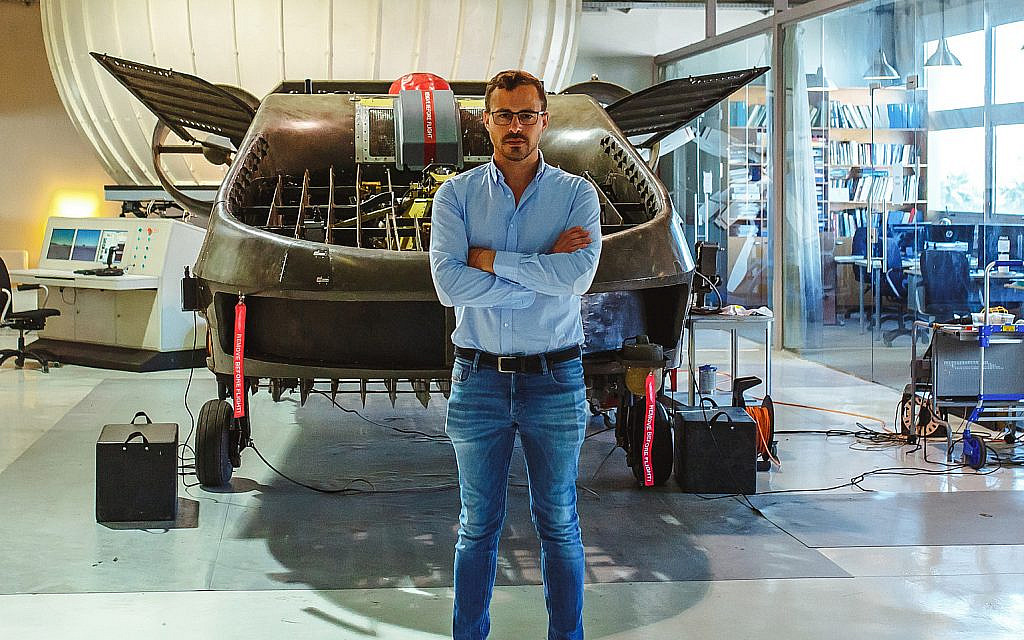
Over 50 cutting-edge Israeli tech companies are featured in the first season of a new series released on Amazon Prime Video on October 18 called “TechTalk.” Season two features startups in New York, and season three hits Los Angeles.
The show’s creator is co-founder of Tech Talk Media, Jonny Caplan. He’s a British-born entrepreneur who moved from England to Israel in 2013 to explore the Startup Nation’s “multipotential” tech scene.
Caplan believes that multipotentiality — a concept first coined by Emilie Wapnick, TED speaker and author of “How to Be Everything” — is the driving force behind the burgeoning success of the startup industry. According to Wapnick, “Instead of picking one thing and denying all of our other interests, we can find ways to integrate our many passions into our lives.”
Caplan explains that by “defying the norm, multipotentialities have no single definitive skill, yet we have a multitude of talents and creativity which we can pursue simultaneously.”
The philosophy inspired him to pursue his flagship documentary series “TechTalk,” the first in a range of titles on emerging global startups and innovators.
What Caplan discovered in Israel — and in particular in his new hometown of Tel Aviv, which has the highest concentration of startups per capita in the world — led him to set up his US-based media and entertainment company with his partner, Ronald R. Hans.
Longtime entrepreneur Caplan serves as the writer, executive producer and co-host of the series, together with Israel’s “The Voice” finalist, Jessy Katz.
“We chose Israel to launch the show as it is the Startup Nation, and the only location on earth that has such a vibrant mix of innovators and technologies in one space,” Caplan says.
While all the showcased startups are impressive, a few stand out to Caplan as exceptional. EyeRon Systems are makers of toughened first response drones that fly indoors into burning buildings to give fire fighters earlier warnings. The CEO and founder Nimrod Ron probably falls into the multipotential category, himself. Ron is an artist, one of Forbes Magazine’s “30 Under 30,” and the youngest person ever to achieve the Honorary Alumni Award from Hebrew University of Jerusalem.
Then there is Intuition Robotics, which pioneers a small robot device called ElliQ designed to provide companionship for the elderly. With more than 70 percent of over people older than 70 living alone, dementia and other diseases pose a higher risk. ElliQ provides someone to talk to and checks up on its “companion,” suggesting exercise, games to play and even connects via Skype to family members.
“Israel has such a wealth of exciting new startups and technologies, [the show was] spoiled for choice,” says Caplan.
Guests include Natan Barak, founder of Mprest Systems, which produces one of the three crucial components of the Iron Dome Defense System, Jonathan Medved, founder and CEO of OurCrowd, the Jerusalem based crowdfunding giant, and, perhaps incongruously, Montel Williams, US television personality and entrepreneur.
Each episode of “TechTalk” covers a range of different technologies and business verticals. Its first season includes flying cars, 3D holographic surgery, the Israeli robot soccer team, cannabis scanners, car hackings, augmented reality snowboarding, mind-controlled gaming, and more.
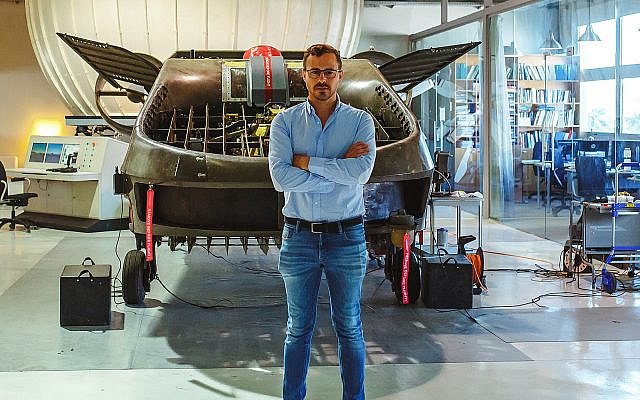
Host and executive producer Jonny Caplan stands in front of an Urban Aeronautics flying car during filming for Season One of ‘TechTalk,’ to be released on Amazon Prime on October 18, 2019. (Courtesy)
Caplan asserts that anyone can develop their potential, no matter their background or education. As a case in point he refers to Boys Town Jerusalem, a dormitory school for pupils from underprivileged homes, many of whom have suffered much distress or trauma. Funded by the government and through donors, the school focuses on technology education, and was the first academy in the Middle East to have Cisco Networking.
“All humans have the resources to develop a range of creative abilities,” Caplan says. “Usually it takes some push or reaction to cause these to be woken up — however, with the right motivation and drive, the possibilities are endless.”
In spite of his optimism, Caplan’s own personal experience keeps him realistic about the hardships and threats that can exist in creating long term businesses. When he was 25 years old, his company experienced a hostile takeover while he was abroad in Israel for a wedding for a few days. The fruits of his labor vanished overnight.
“My initial reaction was sheer shock. But I wasn’t going to allow the hijacking of all my hard work and innovation to derail me,” Caplan says.
Within a short time Caplan managed to set up a new company in consumer electronics. While scarred by the harrowing shock of the takeover, he views this “setback” as an educational experience which actually enabled him to grow significantly. In particular, Caplan believes it has enabled him to unleash creative energies that may have otherwise remained dormant, something that aligns him firmly with the founders of many startups.
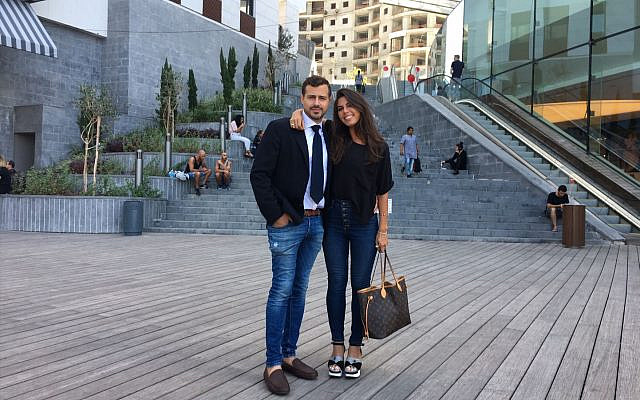
‘TechTalk’ hosts Jonny & Jessy pose for a photo during a busy day filming for Season One, which features 50 Israeli startups, and releases on Amazon Prime on October 18, 2019. (Courtesy)
Since arriving in Israel he has shared his business acumen by providing strategic direction and Western resources to several leading Israeli startups, some of which are referred to in Dan Tenor and Saul Singer’s bestseller “The Start-up Nation.” Although the book came out a decade ago, the story of the country’s economic miracle is still inspirational.
When Caplan was first introduced to Jessy Katz he instantly knew she was the right partner to co-host “TechTalk.” The two are both creative, artistic and entrepreneurial personalities and Caplan describes the dynamic as a “meeting of minds.”
Caplan has been a performer since the age of eight when he appeared on the BBC. He is also an artist, guitarist, pianist and writer. At age 14, he launched his first business creating digital games and platforms. Following his degree in interior architecture he got the real entrepreneurial bug when he saw the opportunity to create and innovate from any internet-ready computer, as the online industry began to flourish in 1999.
New Yorker Katz is a singer, songwriter, actress, voice over artist and jewelry maker. Immediately after she got her degree in communications at Maryland University, she moved to Israel in 2011 and appeared as a finalist in the competitive singing show “The Voice” in 2014.
Following her appearance in the show, she co-formed the duo “Yuval and Jessy,” which tours Israel and the world performing folk pop music. Many performances take on an element of social work and music therapy for audiences suffering illness or tragedy, in addition to their conventional bookings. Katz’s songwriting is inspired by a broad range of music from country and Middle Eastern, to artists and groups such as Sarit Hadad, David Broza, Shlomo Artzi, Gypsy Kings and Alabina.
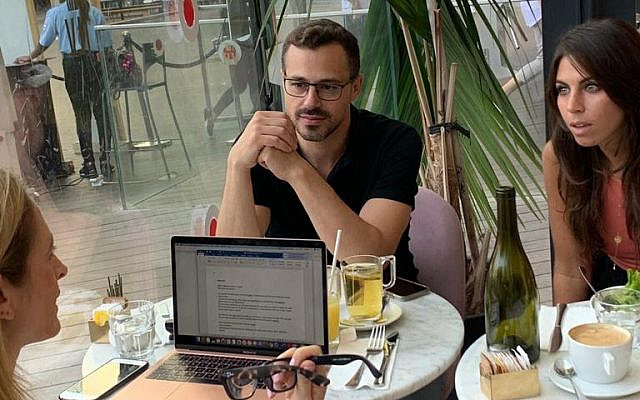
“TechTalk, the Series” hosts Jonny Caplan and Jessy Katz are interviewed by journalist Nadine Wojakovski at TLV Fashion Mall, Tel Aviv. (Courtesy)
Katz is the daughter of film producer Nancy Spielberg and is the niece of Stephen Spielberg. She recently returned from Madrid as the voice over artist for the Spanish TV drama “Money Heist” (La Casa de Palel).
Katz was raised in an Orthodox, Zionist home in the Riverdale section of the Bronx, with a rabbinically-ordained father. She was raised with a deep love of Judaism throughout her school years and at home. This love has been largely influenced by the films her mother has produced, which often have Jewish and Zionist themes.
It is with this rich heritage that Katz felt compelled to emigrate to Israel as soon as she had graduated college. But it has not been without its challenges.
Nothing in New York or anywhere in the world can teach you what living in Israel is like. It’s a struggle
“Nothing in New York or anywhere in the world can teach you what living in Israel is like. It’s a struggle,” concedes Katz, who is fully fluent in Hebrew.
“Nowhere else in the world teaches you the skill and knowledge and experience, not to be lazy and to be able to conquer anything. You learn how not to be a frier, but to be savvy,” she says, using the Hebrew slang term for “sucker.”
By contrast she says living in New York would not have worked for her. “It’s a grid. The second you put me in a grid, there is this ceiling,” she says.
Caplan agrees. “People have many different outlets and you have to be able to adjust. Being here in this country of multi-tasking and multi vocations, you know not to rely on one particular skill but multiple ones,” he says.
In spite of the obstacles that any new immigrant faces, Katz is upbeat.
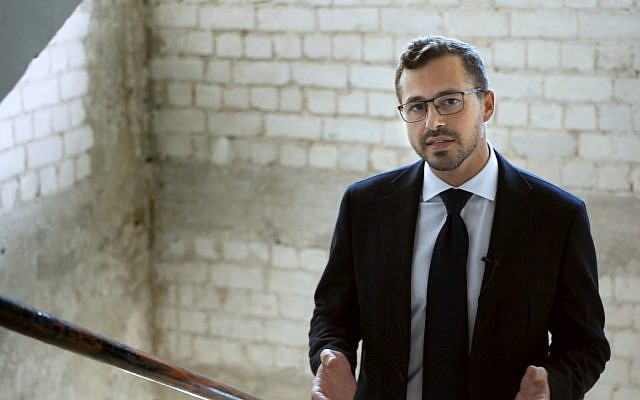
Host and executive producer Jonny Caplan presents for Season One of ‘TechTalk,’ to be released on Amazon Prime on October 18. (Courtesy)
“After doing the hard work I find if you’re willing to put in the effort and put your best foot forward it’s quite easy to find your niche. The attitude of unity and brotherhood is inspiring,” she says. “Every time I have an idea there is someone out there who encourages it and gives me connections. It’s a warmth and love. It’s not a business thing but a cultural thing.”
It’s this outlook that mirrors the mission of “TechTalk,” which is to expose new innovations and technology to the world. Next in the pipeline is a series on the medical cannabis industry in Israel and abroad. Indeed, Caplan has just interviewed the Israeli minister for agriculture, Uri Ariel, for the “Cannabis Biz” series, which is due out next year.
“Our passion is to continually expand our knowledge, to innovate, connect and inspire others to demonstrate what we are capable of as human beings,” Caplan says.
“There are too many naysayers in the world,” concludes Jessy. “We open up a world of possibilities to people who don’t have the faith to succeed. We discover rising innovators and broadcast them to the world — to show the world that you can really achieve these things.”





.jpeg)
Comments
Post a Comment